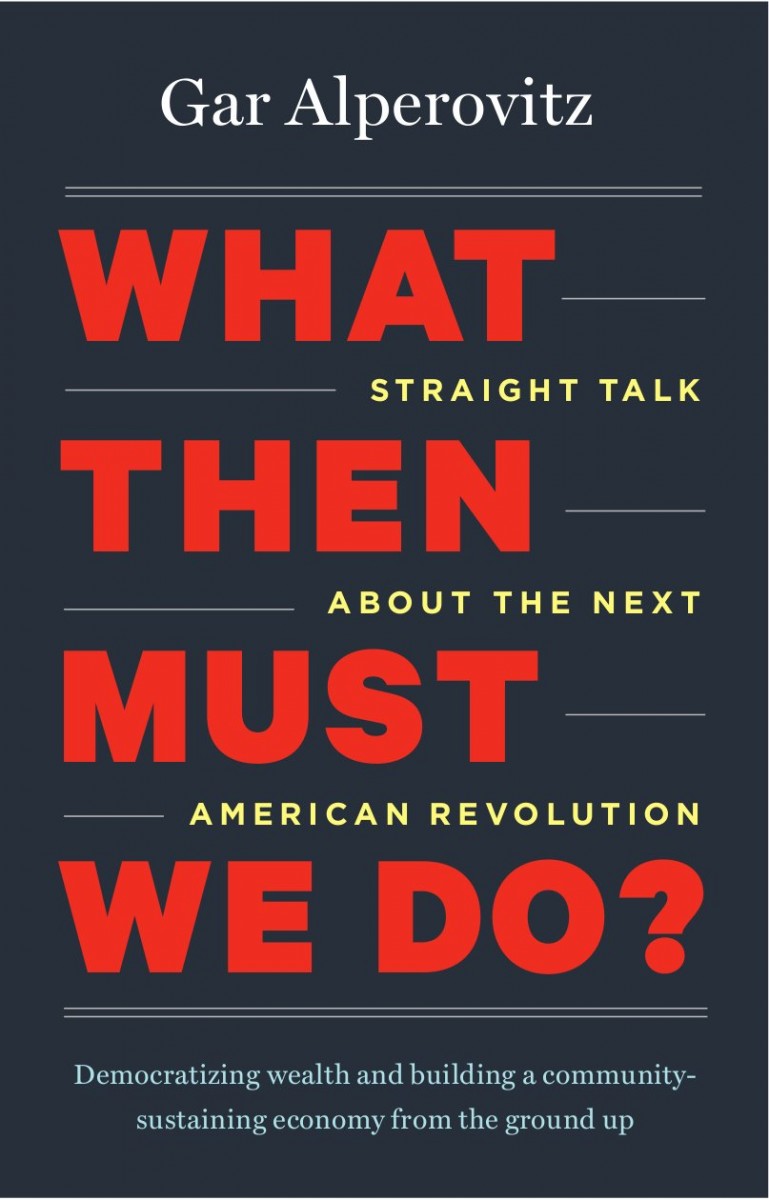
If you're like me you've read several books that list inspiring examples of worker owned businesses and co-ops, suggesting that expanding on such models might begin to right the wrongs of an incredibly unequal society that is growing even more unequal by the day.
The best such collection I've found is in a new book by Gar Alperovitz called What Then Must We Do? This book also offers a powerful argument that radical change is needed, albeit an argument with some possible flaws. First the inspiring examples:
Workers own and run factories in Cleveland, Atlanta, Washington D.C., Amarillo, and many other cities. Labor unions that once opposed worker ownership, including the Steelworkers and several others, now create worker-owned companies. Forty percent of Americans are members of cooperatives, including credit unions. People moved hundreds of millions of dollars, if not billions, from large banks to credit unions and small banks in 2011 and 2012. (That should continue!) Then there are community development corporations and land trusts, alive and thriving. There are even corporations redesigned, and labeled B Corps, chartered under new laws in 12 states to allow them to legally pursue the social good as well as profits.
Employee stock ownership plans make U.S. workers owners of their businesses in great numbers — three million more than are members of unions in the private sector. Federal tax incentives (don't tell Congress!) encourage business owners to sell to their employees. Worker-owned firms are becoming more common. They are also more profitable than other similar companies.It occurs to me that we need a Union-Label type operation to label and catalog the products of worker-owned companies so that we can put our support there.
Local governments are investing in local businesses and land development. A quarter of U.S. electricity comes from publicly owned co-ops. These power companies are more efficient and tend to be greener. The model is being followed by public broadband service. Proposals that meet the textbook definition of socialism are alive and growing in red and blue states alike, and at the local and state levels.
This matters because the national government in the United States is so thoroughly corrupted. I'm not sure Alperovitz ever directly answers the question of how a national plutocracy will be prevented from halting local and state progress on the ownership question, as it has halted local and state progress on other matters.
If the trend toward democratizing ownership is happening under the radar, how can it possibly be kept there while succeeding on the necessary scale? If this approach to economic justice is somehow more inherently "American" than other more foreign ideas, how exactly does that protect it? Weren't family farms and free elections and the Fourth Amendment deemed very American at one point too? Alperovitz recommends a state-by-state approach to single-payer healthcare, but the refusal of California legislators to enact it has come at the bidding of those in Washington. None of which is to suggest that Alperovitz is wrong to promote this strategy — just that it may be very difficult, and some other strategies may help too.
Alperovitz frames his discussion within an understanding of serious systemic failure. Persistent long-term trends toward income and wealth inequality, monopolized corporate power, mass incarceration, and environmental devastation churn ahead in the face of elections, activism, lobbying, and reform legislation, not to mention flip-flopping between Republican and Democratic so-called "leadership." Alperovitz paints these as even longer term trends than we often suppose by dismissing the gains of the middle of the 20th century as an aberration produced by the Great Depression and World War II, and as gains that could not have come without a large labor movement — something he now deems virtually impossible.
Most activist groups, Alperovitz points out, react to cuts in public services by demanding no cuts. This is purely defensive. Alperovitz acknowledges that some also advocate for progressive taxation, but deems this "obviously inadequate" although the obviousness of its inadequacy is not apparent to me, except in the sense that (just like the worker-ownership model) it hasn't succeeded yet on a major scale. Yes, the plutocrats buy the elections. The system is rigged against tax reform. But the goal of advancing the taxation (and elimination) of billionaires as power is gradually obtained seems critical.
Alperovitz seems at times to buy into the notion that there just isn't enough money around, even if the billionaires were to be taxed at 90 percent. But this is wrong, of course. The nation is rolling in money, and the money is piled up in the hands of several hundred people.
It's somewhere else as well, somewhere Alperovitz doesn't propose to look for it. President Obama's proposed budget for 2014 devotes 57% of discretionary spending to an illegal, immoral, counterproductive, and economically destructive operation known as war and preparation for war. While Alperovitz suggests that World War III could save the U.S. economy (were a new world war possible, which he says it isn't), economists say military spending as it exists does less for the economy than other public spending and even less than tax cuts for working people; that is to say, it is worse than nothing.
Alperovitz seems unaware that roughly half of military spending is outside the Pentagon, in Homeland Security, in the CIA, in the State Department, in the Energy Department, etc. So he uses the Pentagon budget alone to argue that military spending is low as a percentage of GDP. This does not of course make it low in terms of actual dollars or as a percentage of global military spending or as a percentage of public spending in the United States. Alperovitz believes there's little money for spending on human needs, but seems not to notice where 57% of discretionary spending is going.
While Alperovitz raises the topic of healthcare because it takes up, he says, 20 percent of GDP, the war machine that swallows 8 or 9 percent of GDP from U.S. government purchases alone (U.S. companies also dominating international weapons sales) gets no consideration. Leo Tolstoy, from whom the book's title is borrowed, would have noticed the existence of the military industrial complex. He would have considered the possibility of economic conversion. Connecticut created a commission this month to pursue conversion from war to peace manufacturing. I suspect Alperovitz would like that model if he took a look at it.
So, here's where I come down. We should be pursuing everything Alperovitz recommends, and then some. We should create worker ownership, tax the rich, cut the military, invest in our society, and act strategically at the local, state, and national levels. We should take very seriously long-term structural failures and stop imagining that another election will fix anything by itself. And we should, as Alperovitz wisely recommends, be preparing the ground for the best possible activism when a moment of greater possibilities arrives, or when we have succeeded in creating it.
3 WAYS TO SHOW YOUR SUPPORT
- Log in to post comments
















